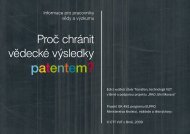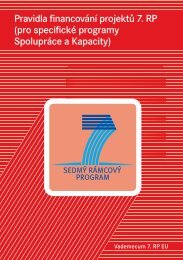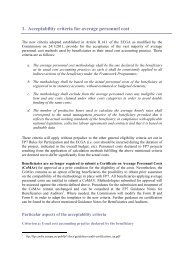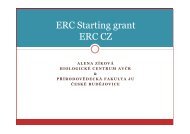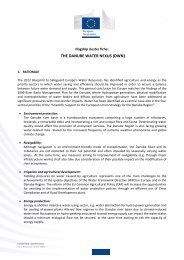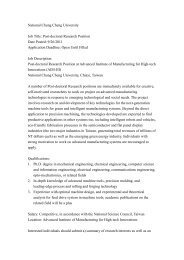Guide to Research and Innovation Strategies for Smart Specialisation
Guide to Research and Innovation Strategies for Smart Specialisation
Guide to Research and Innovation Strategies for Smart Specialisation
You also want an ePaper? Increase the reach of your titles
YUMPU automatically turns print PDFs into web optimized ePapers that Google loves.
Financial engineering instruments<br />
Why should financial engineering instruments be part of smart specialisation?<br />
For more than ten years, the EU budget has been using financial instruments such as loans,<br />
guarantees <strong>and</strong> equity investment <strong>for</strong> SMEs. In the 2007-2013 financial framework a new<br />
generation of financial instruments was put in place in cooperation with the EIB Group. In the<br />
area of structural funds, financial instruments have been set up <strong>to</strong> support enterprises, urban<br />
development, energy efficiency <strong>and</strong> renewable energies through revolving funds. Financial<br />
instruments have been set up <strong>to</strong> support farmers, rural micro- <strong>and</strong> <strong>to</strong>urism businesses, through<br />
the Rural Development Fund.<br />
The Europe 2020 Strategy envisages an increased use of financial instruments as part of an<br />
approach <strong>to</strong> pull <strong>to</strong>gether EU <strong>and</strong> national public <strong>and</strong> private funding in order <strong>to</strong> pursue the<br />
Strategy's objectives of smart, sustainable <strong>and</strong> inclusive growth. In this context, on 6 Oc<strong>to</strong>ber<br />
2011, the European Commission adopted a draft legislative package which will frame<br />
Cohesion Policy <strong>for</strong> the period 2014-2020 which provides a common framework <strong>for</strong> all EU<br />
policies in shared management including, rural development policy <strong>and</strong> maritime policy).<br />
This proposal emphasizes that the role of innovative financial instruments will be enhanced,<br />
by extending their scope <strong>and</strong> by rendering their implementation frameworks more flexible <strong>and</strong><br />
effective, encouraging their use as a more efficient alternative of support or in a<br />
complementary way with traditional grants. The proposal represents a more solid legal <strong>and</strong><br />
operational framework that provides clear <strong>and</strong> simplified rules concerning key<br />
implementation matters such as the financial management of EU contributions or the<br />
combination of financial instruments with grants.<br />
Subject <strong>to</strong> feasibility, financial instruments can be applied <strong>to</strong> the full b<strong>and</strong>width of policy<br />
objectives reflected in programmes, in order <strong>to</strong> deliver investments in projects which<br />
demonstrate appropriate repayment capacity in situations of market imperfection. They can be<br />
deployed by Member States <strong>and</strong> managing authorities either as tailor-made instruments or on<br />
the basis of pre-defined models <strong>for</strong> national or regional instruments which allow <strong>for</strong> efficient<br />
roll-out of operations in line with st<strong>and</strong>ard terms <strong>and</strong> conditions proposed by the Commission.<br />
Managing authorities may also contribute <strong>to</strong> financial instruments set up at EU level, with<br />
resources that will be ring-fenced <strong>for</strong> investments in line with the programmes concerned, <strong>for</strong><br />
example a guarantee facility <strong>to</strong> incentivise financial intermediaries <strong>to</strong> extend loans <strong>to</strong> SMEs in<br />
the cultural <strong>and</strong> creative sec<strong>to</strong>rs (CCS) under the new Creative Europe Programme is being<br />
launched.<br />
Barriers <strong>and</strong> Challenges<br />
Given the relative newness of many of the financial instruments dissemination of in<strong>for</strong>mation<br />
<strong>and</strong> exchange of experiences <strong>and</strong> good practices among Member States, regions <strong>and</strong> financial<br />
intermediaries implementing the financial instruments will remain essential <strong>for</strong> the ongoing<br />
implementation in the present programming period. But also due <strong>to</strong> increased role of financial<br />
instruments as stated in the cohesion policy post-2013 further focus will need be put on the<br />
promotion allowing new potential users <strong>to</strong> get familiar with this innovative way of financing<br />
<strong>and</strong> contribute <strong>to</strong> a smooth <strong>and</strong> rapid implementation of these instruments.<br />
95





